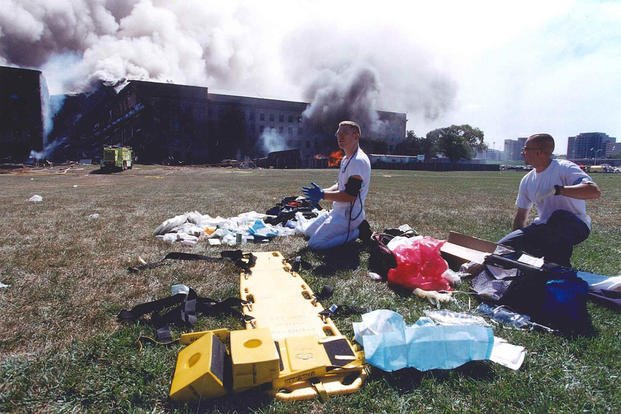
On September 11, 2001, I was serving on active duty at Coast Guard Headquarters in Washington, DC. At the time, the Coast Guard was headquartered in the District near Fort McNair, so it was across the Potomac River from the Pentagon. I was working with the group that coordinated Coast Guard missions and activities with the Department of Defense and I was in fairly regular contact with folks in the Pentagon. That morning I was waiting for a call to tell me when to head over to the Pentagon for a meeting.
Our team worked in a secure space with no windows. Someone with the cyber lock combination to our door stuck his head in and told us a plane had just hit the World Trade Center. Like so many folks we first thought something must have happened to the pilot to cause such a horrific accident. We turned on the TV and, like many of you, watched the horror unfold.
If you were keeping up with events that morning, like me you experienced the realization that one plane could have been an accident, but two planes, then three, then four, were part of a coordinated attack on our country. When the Pentagon was hit, we rushed across the hall to an admiral’s office and saw the smoke and flames rising over the Potomac. I will never forget that sight.
My day was spent trying to locate the Coasties who served in liaison roles in the Pentagon. It took some frantic phone calls, but all were located. One man had stayed home that day but had not yet phoned in to let anyone know; we thought we had lost him. Another, a Reservist like me, was an EMT in civilian life. He was a hero that day treating injured survivors. I had the honor and privilege of calling his family to let them know he was okay. I can still hear the relief in his sister’s voice as, through her tears, she relayed to everyone that Mike was okay. I may have teared up a bit myself.
Civilian workers at nearly all government agencies were sent home, which caused a traffic jam that was epic even by Washington standards. Rumors were rampant that another attack was imminent, that a plane was spotted heading for the White House, another for the Capitol. Of course, the planes stopped crashing, but the day remained surreal. I drove home (to a hotel in the District) late that night. The streets were deserted except for a few roving patrols. The nearly constant noise of aircraft approaching or departing Reagan National Airport was missing. It was an eerie feeling. I spent the next few days on a watch rotation serving with the Department of Transportation, the Coast Guard’s boss at the time. Things obviously settled down, but Washington remained a ghost town for several days.
Of course, life went on and returned to a “new normal.” The Coast Guard’s new boss is the Department of Homeland Security, an agency born of 9/11 and one that most Americans would have never envisioned a need for. Planes stopped flying for a while, but eventually took to the air again, albeit under drastically changed security rules. Americans began adjusting to a world we had not previously known where attacks on our homeland were not only possible, but potentially devastating. A “War on Terrorism” was coming, we all knew it, and those battles are still being fought today.
Nearly one quarter of the US population is under the age of 18. That means over 730 million Americans have no memories of that day. Certainly they live with the aftermath, but they do not know a world where terrorist-flown planes have not crashed into buildings killing people. I am sure many people have learned much in response to the events of 9/11/01. From military leaders to corporate security officials to first responders to travelers – we have all adjusted and learned and implemented those lessons. But there is one lesson from 9/11 that was not new, but perhaps was driven again home that day. In all circumstances we should turn to God. The Psalmist says it best: “Whom have I in Heaven but You? And beside You, I desire nothing on earth.” (Psalm 73:25). Where else would you turn?
It should not take a tragedy to cause people call upon the Lord, but it often does. Church attendance spiked in the months after 9/11, but soon fell back to normal levels. Some people cried out to God; others questioned how God could allow such a tragedy. Despite the attacks, despite the confusion, despite the changes, God was always God.
There can be benefits to a tragedy if it brings someone into relationship with God, but we don’t like to think that way. We want to avoid tragedy (naturally) and definitely don’t want God to get our attention through pain and suffering. Unfortunately, too many of us don’t live in strong relationship with God when there is no pain, no suffering, no tragedy. We might even feel like hypocrites turning to Him in our hour of need when we ignore him the rest of the time.
But He wants us to turn to Him, regardless of the motivation. His arms are strong and His love is overwhelming. And there will be pain. It is part of life in a fallen world among sinful creatures. But in the pain is the constancy of God. He does not change with the pain, and He does not change with the circumstances of our lives. He gave His name to Moses … I am. The very words “I am” give comfort because they guarantee the constancy, the permanence, and the everlastingness of God. He is there and He wants to be with us in every moment of our lives.
To me, the ultimate lesson of 9/11 is one I seem to need to be reminded of every day: Turn to God.